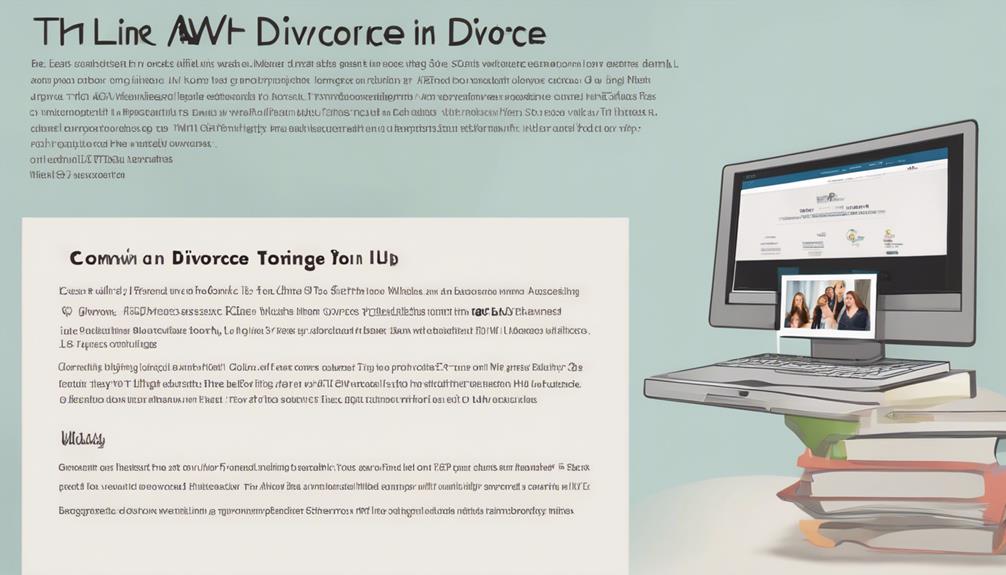When getting an online divorce in Iowa, it is important to adhere to certain procedures. Initially, ensure that all the required forms on the Iowa Courts website are filled out accurately. Also, make sure to meet the one-year residency requirement in Iowa. It is important to note that Iowa only permits no-fault divorces. All necessary documents must be submitted along with the payment of fees. Additionally, correctly serving the respondent with the divorce papers is crucial. Successfully navigating these steps is vital for a smooth online divorce process. For more information and further details on this topic, additional insights are available for those interested.
Key Takeaways
- Complete Iowa divorce forms accurately online.
- Ensure all personal and financial details are correct.
- File and pay fees on the Iowa Courts website.
- Serve respondent with divorce papers properly.
- Seek legal advice for guidance if needed.
Iowa Divorce Process Overview
The Iowa divorce process begins with filing specific forms online through the Iowa Courts website. These forms are essential to kickstart the legal proceedings to dissolve the marriage. To file for divorce in Iowa, one must make sure they meet the residency requirement, which typically means either spouse must have lived in Iowa for at least one year. Iowa operates on a no-fault divorce basis, meaning the only accepted grounds for divorce are the irretrievable breakdown of the marriage.
During the filing process, individuals need to submit the required documents, pay necessary fees, and may seek financial assistance if needed. It's important to serve the respondent with the divorce papers properly. Serving the respondent involves delivering the legal documents to ensure they're aware of the divorce proceedings. Additionally, observing the waiting period mandated by the Court is crucial before the divorce can be finalized, allowing both parties time to think about the situation before moving forward.
Residency and Grounds for Divorce

To file for divorce in Iowa, one must meet the residency requirement of having resided in the state for at least one continuous year. Iowa strictly enforces this one year continuous residency rule for the petitioner to have the legal grounds to file for divorce.
The grounds for divorce in Iowa are based on the breakdown of the marital relationship, with only no-fault grounds being recognized. Unlike some states, fault-based divorces aren't permitted in Iowa.
These residency requirements play a vital role in establishing jurisdiction for divorce proceedings within the state. Iowa's legal grounds for divorce are limited to recognizing the breakdown of the marital relationship, ensuring that divorces are granted based on this specific criterion.
Completing Divorce Forms Accurately
When completing divorce forms, it's vital to make sure all fields are accurately filled out to prevent any delays in the process.
Double-checking personal details, financial information, and agreements with the spouse is essential for a smooth procedure.
Following the provided instructions meticulously will guarantee compliance with Iowa divorce laws.
Form Filing Tips
Prior to submitting your divorce forms, ensure precise completion by thoroughly filling out all required fields and double-checking personal details. Verify that information regarding child support, spousal support, property division, and financial affidavits is accurately provided. Follow the divorce process by seeking legal advice if necessary to correctly complete the forms.
Be attentive to court requirements and specific formatting instructions to prevent delays or rejections. Review the completed forms meticulously to catch any errors or inconsistencies before submission. Seeking assistance from a legal professional can help guarantee the accurate completion of the divorce forms, providing you with peace of mind during this process of legal grounds dissolution.
Accuracy Importance
Maintaining accuracy when completing divorce forms is essential for guaranteeing the legal validity of the documentation. Mistakes in these forms can result in delays, additional costs, or even rejection by the court.
To avoid such issues, it's vital to fill out the forms clearly and accurately. Attention to detail during this process is key as it helps in presenting a precise picture of the divorce terms and agreements, preventing misunderstandings and disputes later on.
Seeking assistance from a legal professional or utilizing online resources can aid in accurately completing divorce forms. By taking the time to guarantee accuracy and correctness in filling out these forms, individuals can navigate the divorce process more smoothly and efficiently.
Uncontested Divorce Details

In uncontested divorces in Iowa, both spouses must come to an agreement on all major issues such as property division, child custody, and support. This agreement is formalized through a settlement agreement that outlines the decisions made by the couple.
In Iowa, uncontested divorces can proceed without a court hearing, provided all necessary paperwork is accurately completed and submitted. Once the paperwork is in order, the uncontested divorce process in Iowa can be finalized relatively swiftly, often taking only a few months from the initial filing to reach completion.
Uncontested divorces are generally favored for their speed, lower costs, and reduced conflict compared to contested divorces. By reaching a mutual agreement on key aspects like property division, child custody, and support, couples can streamline the divorce process and move forward with their lives in a more amicable and efficient manner.
Child Support in Iowa

Iowa child support guidelines dictate how support is determined, considering factors like income and expenses. Calculating child support involves using a formula that accounts for both parents' earnings.
Modifying support orders in Iowa can be done under certain circumstances, ensuring that payments reflect the child's needs accurately.
Support Guidelines in Iowa
Child support in Iowa, based on the Income Shares Model, considers the incomes of both parents to determine the required amount of support for the children. Iowa's Child Support Guidelines aim to guarantee adequate financial support for children post-divorce.
The Iowa Child Support Recovery Unit (CSRU) enforces child support orders, utilizing methods like wage garnishment to secure timely payments. When calculating child support, factors such as the number of children, custody arrangements, and each parent's financial resources are taken into account.
Typically, child support payments in Iowa continue until the child reaches the age of majority or finishes high school, whichever occurs later. These guidelines serve to assure that children receive the necessary financial assistance from both parents following a divorce.
Calculating Child Support
Considering the financial circumstances of both parents and the needs of the children, the calculation of support in Iowa follows the Income Shares Model.
Iowa's Child Support Guidelines outline a formula that considers the combined incomes of both parents, along with factors like childcare expenses and health insurance costs. Special circumstances, such as a child's special needs, are also taken into account.
The Iowa Child Support Recovery Unit (CSRU) plays an important role in enforcing child support orders through mechanisms like income withholding.
Typically, child support in Iowa continues until the child reaches the age of majority or graduates from high school, unless specific exceptions apply due to special circumstances.
Modifying Support Orders
When seeking to modify child support orders in Iowa, parents can request changes based on significant shifts in circumstances impacting the child's well-being or financial requirements. These modifications can address changes in income, healthcare needs, educational expenses, or custody arrangements.
The Iowa Child Support Recovery Unit (CSRU) is available to assist in adjusting child support orders and ensuring compliance. Both parents have the option to request a review of the child support order every three years to guarantee it aligns with the child's current needs.
Seeking the guidance of a family law attorney experienced in these matters can help navigate the process efficiently. Understanding the criteria for modification and working through the appropriate channels is crucial for a successful outcome.
Costs and Fees Breakdown

Online divorce services in Iowa provide a transparent breakdown of costs and fees to help clients understand the financial aspects of the process upfront. The cost of an online divorce in Iowa typically ranges from $139 to $299, depending on the service provider. Additional fees may apply for services like document preparation, filing assistance, and court filing fees. Providers make sure clients comprehend the costs involved upfront through clear pricing breakdowns.
Some services offer payment plans or discounts for military personnel, enhancing accessibility and affordability for individuals seeking online divorce. Understanding the fee structure and costs associated with these services allows individuals to budget effectively for their divorce process. By providing upfront information on costs and potential additional fees, online divorce services empower clients to make informed decisions about their divorce proceedings in Iowa.
Contact Information for Assistance

To seek help with online divorce services in Iowa, individuals can easily find contact information on the service provider's website. When requiring assistance during the divorce process, having access to support is vital. Here are some ways individuals can reach out for help:
- Phone Numbers: Clients can call the provided phone numbers to speak directly with customer service representatives for guidance.
- Email Addresses: Sending inquiries or concerns via email can be an effective way to get help with online divorce services.
- Live Chat Support: Some online divorce service providers offer live chat assistance for immediate help with any questions or issues.
Having access to contact information for assistance is important for managing the complexities of the online divorce process in Iowa. Whether through phone calls, emails, or live chat support, individuals can find the assistance they need to progress with their divorce proceedings.
Frequently Asked Questions
Can You Do an Online Divorce in Iowa?
Yes, they can do an online divorce in Iowa. It provides a simplified process without the need for attorney involvement. Services offer options for uncontested, same-sex divorces, and annulments with transparent pricing and payment plans available.
What Is the Fastest Way to Get a Divorce in Iowa?
The fastest way to get a divorce in Iowa is through an uncontested agreement. Quick finalization, as fast as 90 days, is possible when both parties cooperate. Online services can streamline the process further.
Can I Get a Divorce in Iowa Without a Lawyer?
One can get a divorce in Iowa without a lawyer if both parties agree on all terms. It's called an uncontested divorce. While self-representation can be cost-effective, consulting with an attorney is wise for legal guidance and compliance.
What Is the Cheapest Way to File for Divorce in Iowa?
The cheapest way to file for divorce in Iowa is through online services, saving couples money on attorney fees. It provides a cost-effective and streamlined option for uncontested divorces, offering transparent pricing and payment plans.
Conclusion
To sum up, online divorce in Iowa can be a straightforward process if steps are followed accurately. One interesting statistic to note is that Iowa has a relatively low divorce rate compared to other states in the US, with only 2.6 divorces per 1,000 residents in 2020.
By understanding the residency requirements, completing forms correctly, and considering child support details, individuals can navigate the divorce process efficiently. For further assistance, contacting legal resources or professionals is recommended.










